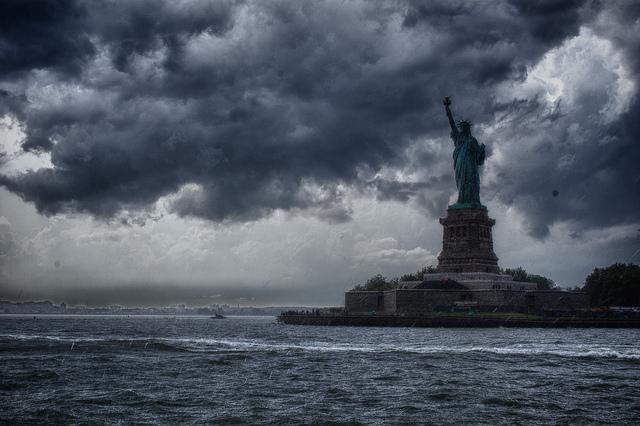
In the wake of the first presidential debate, we’ve settled into the political trivia season: did Trump have the sniffles? But there are much larger questions at stake. For example, are we about to see a prolonged period when ‘America First’ dominates US strategic policy, regardless of who wins on 8 November? I’m trying not to use the i-word here, because America First needn’t actually mean ‘isolationism’. But I’m concerned that the positions Trump’s retailing reflect a longer-term and more substantial shift in the US electorate’s thinking about America’s role in the world.
To test that proposition, I went back to some of the Pew Research Center’s surveys. I started with their May 2016 report, America’s place in the world. The key conclusion?
‘The public views America’s role in the world with considerable apprehension and concern. In fact, most Americans say it would be better if the U.S. just dealt with its own problems and let other countries deal with their own problems as best they can.’
Oh. ‘Most Americans’. That doesn’t sound good. Some might see that finding as an historical anomaly—except it isn’t. The report finds that the US public ‘remains wary of global involvement, although on some measures, support for U.S. internationalism has increased modestly from the historically low figures found in the 2013 study’.
Goodness. ‘Increased modestly’. So what did the 2013 report find? Let’s see:
‘Growing numbers of Americans believe that U.S. global power and prestige are in decline. And support for U.S. global engagement, already near a historic low, has fallen further. The public thinks that the nation does too much to solve world problems, and increasing percentages want the U.S. to…pay more attention to problems here at home….For the first time in surveys dating back nearly forty years, a majority (53%) says the United States plays a less important and powerful role as a world leader than it did a decade ago.’
Gloomy. But, hey, this is a four-year survey, so let’s cast back to the 2009 report. Perhaps it was more optimistic? Unfortunately, no:
‘In the midst of two wars abroad and a sour economy at home, there has been a sharp rise in isolationist sentiment among the public. For the first time in more than 40 years of polling, a plurality (49%) says the United States should “mind its own business internationally” and let other countries get along the best they can on their own.’
Okey dokey. Well, let’s go all the way back to the 2005 report, within spitting distance of 9/11. What did it find?
‘As the Iraq war has shaken the global outlook of American influential, it has led to a revival of isolationist sentiment among the general public. Fully 42% of Americans say the United States should “mind its own business internationally and let other countries get along the best they can on their own.” This is on par with the percentage expressing that view during the mid-1970s, following the Vietnam War, and in the 1990s after the Cold War ended.’
In brief, then, the American public was gloomy about America’s ability to solve world problems in 2005 and has become gloomier since. That’s not a strong basis for the exercise of US global leadership. In democracies, majorities eventually get what they want. Perhaps allies and partners should be more concerned about the long-term trajectory of US global engagement, and less concerned over whether one of the presidential candidates has a cold.
There are two qualifiers to the argument I’ve sketched above. First, US foreign and strategic policy tends to be more the business of elites than of the broader electorate. Since Harry Truman took the US down the path of global engagement after World War 2, those elites have shared a bipartisan view that the US must lead. Does that view still hold? There’s a second qualifier—about America’s likely future behaviour. Older readers might remember Randy Newman’s Political Science. (‘Boom goes London, and boom Paree.’) In reality, a disenchanted US is unlikely to fix its global problems by lashing out. The more likely consequence is a quickening tempo of US disengagement.
In retrospect, the post-World War II period might come to be seen as an anomaly in US strategic policy. The US was a reluctant entrant to two world wars. True, once roused it showed itself able to bring massive resources to bear. And perhaps that’s the biggest change between then and now—in the 20th century the US outmuscled everyone else, propelled by its unmatched industrial might. Today much of the world has caught up. America’s ability to project power is still formidable, but the differential has reduced. A US that draws into itself today mightn’t be able to come back out and settle matters in the way it once did.